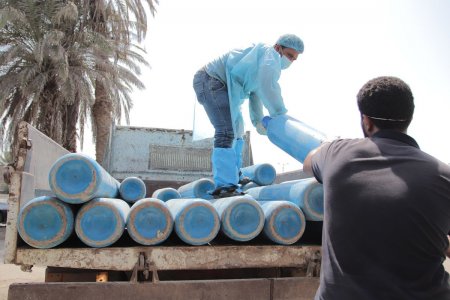
Since the start of the pandemic, affordable and sustainable access to oxygen has been a growing challenge in low- and middle-income countries.
COVID-19 has put huge pressure on health systems, with hospitals in many LMICs running out of oxygen, resulting in preventable deaths and families of hospitalised patients paying a premium for scarce oxygen supplies.
Oxygen is an essential medicine, and despite being vital for the effective treatment of hospitalised COVID-19 patients, access in LMICs is limited due to cost, infrastructure and logistical barriers. Health facilities often cannot access the oxygen they require, resulting in the unnecessary loss of lives.
Recognising the central importance of sustainable oxygen supply — alongside therapeutic products such as dexamethasone — for the treatment of COVID-19, the Access to COVID Tools Accelerator Therapeutics pillar (co-led by Unitaid and Wellcome), is taking a new role to coordinate and advocate for increased supply of oxygen, and, in partnership with a WHO-led consortium[1], is today announcing the launch of a COVID-19 Oxygen Emergency Taskforce.
It is estimated that more than half a million people in LMICs currently need 1.1 million cylinders of oxygen per day[2], with 25 countries currently reporting surges in demand, the majority in Africa. This supply was constrained prior to COVID-19 and has been exacerbated by the pandemic.
Dr Philippe Duneton, Executive Director of Unitaid, said: “This is a global emergency that needs a truly global response, both from international organisations and donors. Many of the countries seeing this demand struggled before the pandemic to meet their daily oxygen needs. Now it’s more vital than ever that we come together to build on the work that has already been done, with a firm commitment to helping the worst-affected countries as quickly as possible.”
The taskforce has determined an immediate funding need of US$90 million to address key challenges in oxygen access and delivery in up to 20 countries, including Malawi, Nigeria and Afghanistan. This first set of countries has been identified based on assessments coordinated by WHO’s Health Emergencies Programme, in order to match in-country need with potential financing, such as through the World Bank and the Global Fund. Unitaid and Wellcome will make an immediate contribution of up to US$20 million in total for the emergency response. The urgent, short-term requirements of additional countries will be measured and costed in the coming weeks, with the overall funding need over the next 12 months estimated by ACT-A to be US$1.6 billion – a figure that will be regularly reviewed by the taskforce.
SOURCE: WHO







